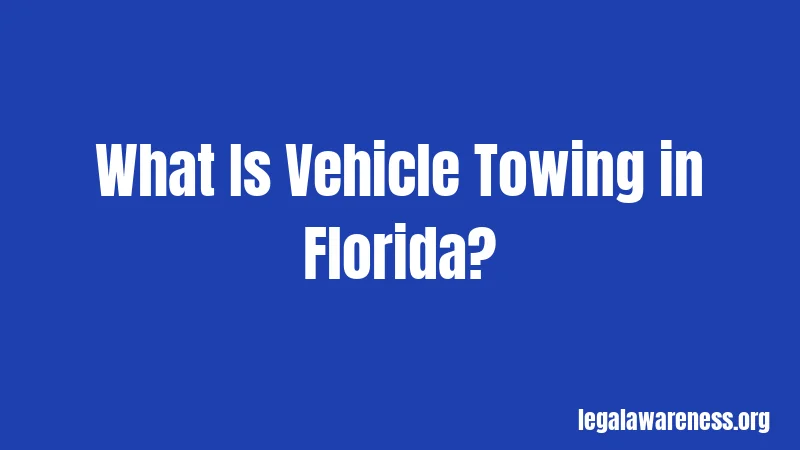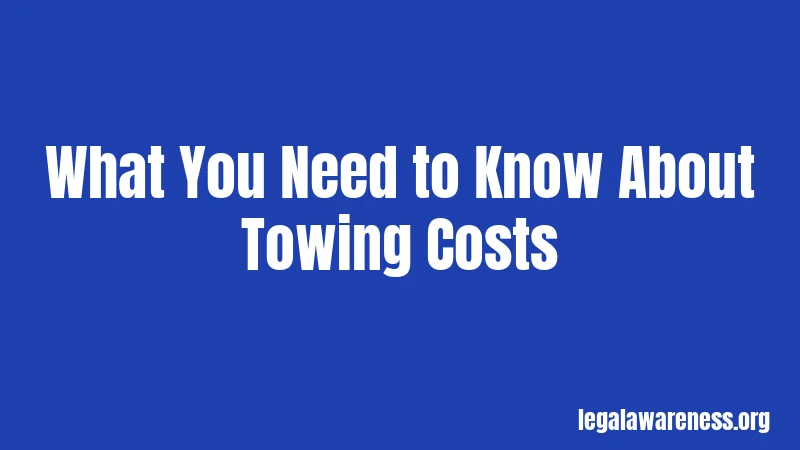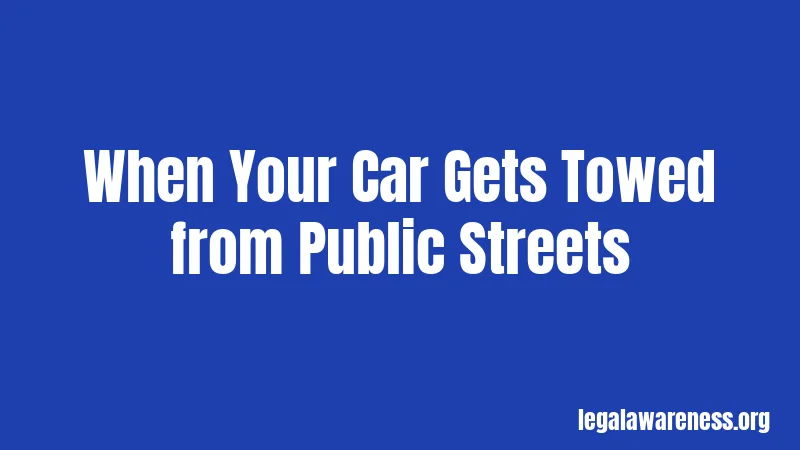Florida Towing Laws (2026): Your Parking Rights and Tow Rules Explained
Most people have no idea how strict Florida’s towing laws actually are. Seriously. Your car can be towed from private property in minutes, and you might have zero recourse. But here’s the good news: once you know the rules, you can protect yourself from unexpected towing situations.
This guide breaks down everything Florida drivers and property owners need to know about towing laws. We’ll cover when tows are legal, what your rights are, penalties for illegal towing, and how to report problems. Let’s dig in.
What Is Vehicle Towing in Florida?

Towing means removing a vehicle from where it’s parked and transporting it to another location. It usually happens because the car is parked illegally, the owner hasn’t paid parking fees, or the vehicle is blocking access to something important.
Here’s the thing though: Florida has two completely different sets of rules. Private property towing and public property towing follow different laws. That’s actually important to understand, because your rights change depending on where your car was parked.
Florida’s Main Towing Laws
Private Property Towing
Private property towing is what happens in parking lots, apartment complexes, shopping centers, and other places that aren’t owned by the government. Think of it like a traffic ticket, but the property owner gets to make the rules.
In Florida, a property owner can have your vehicle towed from their property without much warning. Really, they can do it with almost zero notice. The only requirement is that they post a sign saying towing is allowed. That’s it. Honestly, that’s the part that surprises most people.
The sign must be visible and state that “Unauthorized vehicles will be towed at owner’s expense.” The sign needs to include the towing company’s name and phone number. If you see that sign, you need to understand that they’re serious about towing.
Here’s where it gets interesting: the towing company must charge a maximum rate set by local regulations. Florida doesn’t set a statewide maximum, so each city or county sets its own limits. In Miami, for example, the maximum tow fee might be different than in Tampa. Call your local city or county first.
Public Property Towing
Public property includes streets, highways, and government parking areas. Towing from public property is way more regulated. Police officers and authorized personnel must follow specific rules before your car gets towed.
Parking violations, expired meters, blocking fire hydrants, or parking in handicapped spaces without a permit can all result in towing. But here’s the important part: the officer usually needs to issue a citation first, or there needs to be an immediate safety hazard.
Recent Changes to Florida Law (2025)
Florida updated its towing regulations in 2025 to better protect consumers. New rules require towing companies to provide written notice of charges before releasing vehicles. Additionally, storage fees have limits. Most counties now cap daily storage at $30 per day for the first five days, then $20 per day after that.
These rules make it harder for towing companies to charge outrageous fees. If your tow bill seems way too high, Florida’s new rules might protect you.
What You Need to Know About Towing Costs

Towing fees in Florida vary wildly depending on where you are. A basic tow might cost $75 to $150, but it can go much higher. Longer distances cost more. Heavy vehicles cost more. Towing at night or on holidays? That can add $25 to $100 to your bill.
Storage fees are where things get really expensive. Once your car sits in a towing lot, you’re paying daily storage. Florida’s new rules cap this, but it still adds up fast. Get your car back within a day or two, or storage becomes your biggest expense.
Waiting to retrieve your vehicle is expensive. Don’t wait. The sooner you get your car, the sooner you stop paying storage fees.
Illegal Towing and Your Rights
Not all tows are legal, even if they look official. If a tow was illegal, you might be able to get your money back and even win a lawsuit.
Illegal towing includes situations where no proper sign was posted, where the towing company didn’t follow state procedures, or where the tow was done without authorization. If a property owner didn’t actually own the property, for example, they can’t authorize a tow. If a towing company towed your car despite you being parked legally, that’s illegal.
You’re not alone, this confuses a lot of people. Many property managers don’t know the exact rules. Many towing companies bend the rules. But Florida law is clear: if procedures weren’t followed, the tow was illegal.
If you believe your car was towed illegally, you can file a complaint with your county’s consumer protection office. You can also sue in small claims court to recover towing and storage fees. Document everything: photos of the parking area, photos of signs (or lack of signs), receipts for towing fees, and any communication with the property owner.
What Towing Companies Must Do (and What They Can’t)
Towing companies must follow specific Florida regulations. Here’s what they actually have to do: they must provide contact information immediately. They must allow you to retrieve personal items from your vehicle before it goes into storage. They must keep detailed records of when your vehicle arrived and what fees they charged.
They cannot charge surprise fees that weren’t disclosed. They cannot damage your vehicle during the tow. They cannot charge storage fees that exceed local limits. They cannot refuse to release your vehicle if you’ve paid all legal fees and charges.
Wait, it gets better. Towing companies must give you a written invoice showing exactly what they charged and why. If you paid with a credit card, they need documentation of that charge. If storage fees seem high, ask for proof of the daily rates they charged. Keep all paperwork.
When Your Car Gets Towed from Public Streets

Public property towing (streets, public parking lots, highways) is different from private property towing. This is usually authorized by police or parking enforcement.
Your car can be towed from a public street for these reasons: parking illegally (expired meter, wrong zone, blocking something important), having too many unpaid parking tickets, having an expired registration, or being abandoned. Honest assessment? Most public tows happen because of parking violations.
If your car is towed from a public street, you need to contact the local police department or city’s towing division. They’ll tell you where your car is and what fees you owe. Public tows usually include the towing fee plus storage plus administrative costs. Some Florida cities charge $100 for the tow plus $30 daily storage. Others charge more.
Here’s something important: you have the right to retrieve personal property from your vehicle within 24 hours, even before paying towing fees. But you can’t drive it away. You can only get your belongings.
Penalties for Illegal Towing
If a towing company or property owner tows your vehicle illegally, Florida law provides damages. You can sue for the cost of the tow, storage fees, rental car costs while your vehicle was gone, and sometimes additional damages.
Florida also has criminal penalties for towing companies that really break the law. Unlicensed towing operators can be charged with a misdemeanor. Towing companies that engage in fraud or theft can face felony charges. These are rare, but they happen when companies consistently violate consumer protection laws.
Wondering what counts as “illegal”? Here are common examples: towing without proper signage, towing from your driveway without permission, charging fees that exceed legal limits, refusing to return your vehicle after you’ve paid all legitimate charges, and towing based on unpaid parking tickets from a different county.
The takeaway? If you believe you were illegally towed, contact your local consumer protection office or a lawyer. Many attorneys work on contingency for towing disputes, meaning you don’t pay unless you win.
Protected Vehicles and Special Rules
Some vehicles have extra towing protections. Vehicles belonging to disabled drivers with proper permits have restrictions on where they can be towed. A disabled driver’s accessible van cannot be towed from private property unless the sign specifically says so and is easily visible.
Military vehicles parked on military bases have different rules altogether. Vehicles parked on federal property follow federal regulations, not just Florida state law.
If you’re renting a vehicle through a rental company, the rental company (not you) is responsible for towing fees. The rental agreement usually lets them charge fees to your account. Read your rental agreement carefully. Some rentals exclude you from certain parking areas specifically to avoid towing fees.
How to Protect Your Vehicle from Towing
The best defense against being towed? Know the parking rules and follow them. Really, that’s it. Don’t park illegally. Pay your parking meters. Don’t overstay posted limits. Get off the road during street cleaning hours.
When parking on private property, look for those towing signs. If you see one, you know the rules. Assume they’re serious. The last thing you want is coming back to an empty parking spot where your car used to be.
Read parking signs carefully. Some say “No Parking 7am to 10am Monday through Friday.” Some say “Tow Zone, Permit Required.” Some say “Reserved Parking.” Each one means something different. Take 10 seconds to read the sign. Really, just read it. Most towing happens to people who didn’t read the sign.
Keep your vehicle registration current. An expired registration can trigger a tow from public property. Keep your parking permits visible if required. Don’t park in spots designated for disabled drivers unless you have a proper disabled placard. These things seem obvious, but you’d be surprised how often people get towed for these exact violations.
If you’re parking at an apartment complex, ask for a parking guide. Most complexes have parking rules in the lease. Understand which spots are yours, where guests can park, and where absolutely no parking is allowed.
If Your Car Actually Gets Towed
Okay, pause. Read this carefully. If your car gets towed, act fast. Time matters. Storage fees increase every day. The longer you wait, the more you owe.
First, find your car. If it was from a public street, call the local police non-emergency number or the city’s towing division. Ask where your vehicle is. They’ll tell you the towing company and the location of the storage lot.
If it was from private property, the property owner or manager should give you the towing company information. The signage at the property should have the company’s phone number. Call them immediately. Ask about the fees: towing, storage, and anything else you owe.
Next, gather information. Ask the towing company for an itemized invoice. Don’t just pay the first quote. Ask if fees are negotiable. Some companies will reduce storage fees if you retrieve your vehicle quickly. Ask about payment options. Many accept credit cards, cash, and payment plans.
Before you pick up your vehicle, inspect it with a representative from the towing lot. Document any damage with photos. If the towing process damaged your vehicle, you might be able to sue the towing company for damages. Your photos are proof.
Reporting Illegal Towing
If you believe you were illegally towed, report it. Your complaint matters. When enough people report problems, agencies investigate and sometimes shut down bad operators.
Contact your county’s consumer protection office. They have a division that handles towing complaints. You can file online or by phone. Provide details: your vehicle description, the date and location of the tow, the towing company name, and your parking situation.
You can also file a complaint with the Florida Attorney General’s office. Their consumer protection section investigates towing fraud and illegal practices. When they get multiple complaints about the same company, they can take action.
For public property tows that seem wrong, contact your city’s code enforcement or parking division. If your car was towed from a public street but you believe you were parked legally, request a hearing. Many cities offer hearings where you can present your case.
A friend asked me about this last week. Turns out, her car was towed because the property manager thought she didn’t have a lease. She did. They towed her car anyway. She filed a complaint with the consumer protection office. They sided with her. She got her towing and storage fees refunded.
Special Circumstances and Exceptions
Some situations have special towing rules. If you’re in a homeowners association community, the HOA might have towing authority. HOA towing rules can be stricter than city rules. Check your HOA documentation. Many HOAs reserve the right to tow vehicles that violate their rules.
If your vehicle is parked on property during an emergency or natural disaster, different rules might apply. After a hurricane, for example, some towing restrictions are temporarily lifted to clear roads. This is temporary though. Normal towing laws resume once the emergency ends.
Commercial vehicles have different rules than personal vehicles. If you own a commercial vehicle or operate a fleet, commercial towing laws apply. These are even stricter in some ways.
Valet parking is different too. When you hand your keys to a valet, you’re authorizing them to move your vehicle. They’re not “towing” you illegally. You agreed to it. But valet companies must still follow rules about vehicle safety and storage.
Frequently Asked Questions
Can a landlord tow my car from an apartment parking lot?
Only if you’re violating parking rules and proper signage was posted. If the lease specifies parking rules and you violated them, yes. But the landlord must have posted visible towing signs. Personal disputes between you and your landlord don’t automatically give them towing rights.
What’s the fastest way to get my towed car back?
Call the towing company immediately. Pay your fees right away. Most towing companies are open 24/7. The faster you pay, the faster you get your car. Every day of delay costs money in storage fees.
Can I sue a towing company for damages?
Yes, if they damaged your vehicle during the tow or their operation was illegal. Take photos of any damage and get a repair estimate. Document everything. Small claims court handles most towing disputes and doesn’t require a lawyer.
Does my insurance cover towing fees?
Usually not. Comprehensive or roadside assistance coverage might pay for a tow you authorize (like a breakdown), but not for illegal parking tows. Check your policy. The good news? Most roadside assistance plans cover breakdown tows for around $5 to $10 per month.
How long can a towing company hold my vehicle?
Florida law doesn’t set a specific limit, but your vehicle can’t be held indefinitely. Once you pay all legitimate fees, you have the right to retrieve it immediately. If you can’t pay right away, ask about payment plans. Towing companies usually work with people, at least more than you’d think.
Final Thoughts
Here’s what you really need to know: Florida towing laws exist to prevent parking violations, but they also protect consumers. You have rights. Towing companies have rules they must follow. Property owners have limits on what they can do.
The best strategy is prevention. Read parking signs. Follow the rules. Park in authorized spaces. If you get towed, act fast. Get your car back quickly to minimize storage fees. If you believe the tow was illegal, report it and consider legal action.
Stay informed, stay safe, and when in doubt, call a lawyer. Most give free consultations. They’ll tell you if you have a case worth pursuing. Now you know the basics. Use that knowledge to protect your vehicle and your wallet.
References
Florida Statutes Chapter 715 – Property Rights (Towing and Storage): https://www.flsenate.gov/laws/statutes/715
Florida’s Uniform Traffic Control Law – Public Property Towing: https://www.flsenate.gov/laws/statutes/316
Florida Consumer Protection Information: https://www.myflorida.com/consumers/
Florida Attorney General Consumer Protection Hotline: (866) 9-NO-SCAM
County-Specific Towing Regulations and Complaint Process: Contact your local county government website for specific fee limits and complaint procedures in your area
